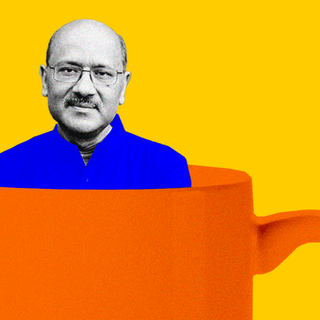
Woe Is Me! “Caring for Parents With Disabilities Is Draining All My Energy. How Do I Cope?”
A series in which The Swaddle team indulges your pity party with advice you’ll probably ignore.

Woe Is Me! is a series in which The Swaddle team indulges your pity party with advice you’ll probably ignore.
“I have a love-hate relationship with my family who struggle with disabilities. My life revolves around hospitals, medicines, uncertainty, and sometimes, a lot of toxicity. I’ve been experiencing this for three years, and I’m extremely drained. I don’t think much has been talked about living with parents who have disabilities and mental illnesses. It sucks how most people don’t even understand what I am going through.”
– No room of my own
PB: Hey, first off, it took a lot of courage to send in this woe, I’m sure. It requires a strong will to voice troubles and concerns that most would decide not to, especially when taking care of family. I can sympathize — it must be challenging to be a caregiver, a friend, and family to parents who cannot operate in what we call the “normal” context. While you know you love them, it must also be extremely draining, — sometimes you long for peace. Hospitals are always depressing, and when you keep walking out of doors every week, it feels like a blight on your life.
I would encourage you to find a reasonable outlet — perhaps a support group for relatives of people with mental illness. Even a few friends you trust and find solace in could help with conversation and maybe a hug. When life has given you a difficult deck, I guess all we can do is play it and hope it shuffles better further. Until then, find comfort in the little things.
SM: Caregiving is such an underappreciated and undervalued task. Most people in India take it for granted, as something you have to do out of obligation and not something you choose to do. I know it can be complicated, but you need to take steps to build a life outside of the caregiving environment and ensure you take time and space to prioritize yourself whenever you need to, without feeling guilty. If you’re able to, you should try and look for and reach out to support groups for caregivers, where you can speak with and understand from other caregivers like yourself on how they cope and what they do to keep their wellbeing intact while finding a way to look after those who depend on them. If there is a sibling or other relatives or friends you can rely on, there’s nothing like it because you need to ensure that you’re not the only one the burden falls on.
DR: Hey there! I’m so sorry to hear that you’ve been dealing with so much without getting the support you deserve — and probably need, even. “Caregiver burnout” and “compassion fatigue” are very real things, but like you pointed out, not as commonly acknowledged. And that can feel like having your genuine struggles invalidated, I guess, which must suck. Unfortunately, I don’t know if there’s a quick way to educate everyone about the toll caregiving can take. However, you could consider therapy to make caregiving seem slightly more manageable and to help you deal with people’s lack of empathy towards your responsibilities. Also, if your close friends, partner(s), or even family members seem dismissive of the impact caregiving can have on your mental health, do you think you could sit them down for a one-on-one conversation and tell them what you’re dealing with, and how their dismissive attitude affects you?
Another idea: if it makes sense for you financially, do you want to consider hiring a full-time, or maybe even part-time medical assistant, to reduce the burden of stress you’re dealing with? Perhaps sharing your responsibilities with a professional caregiver could help you cope better. If not, that’s fine too — I just wanted to throw the idea out. I do hope you can find a way to make this difficult situation more manageable.
AS: What you’re going through is not easy, and I can only imagine how much of a toll it would have taken on your mental health. Notionally, we know that being a caretaker can be emotionally and physically exhausting, but things might be even more challenging when parents are concerned. I’m not sure of the logistical limitations in this situation, but it sounds like you need to start taking some time out for yourself to focus on your wellbeing and recuperate. Do you have a relaxing hobby? Or perhaps you’d like to go on a break somewhere? These ideas might seem extravagant/unnecessary, but it’s only when we’re feeling well that we can summon the energy to help others be well. If you think it’s within your means, maybe you could consider speaking to a therapist? It might not change the reality of needing to take care of your parents, but it might give you a space to talk through your feelings and vent if need be.
RN: I’m sorry that you’re going through this, and you’re right. Most people perhaps don’t understand this experience. It’s always hard for someone to become a caregiver for people supposed to care for them. But feeling frustration and exhaustion is inevitable; you’re doing all you can, but it’s hard when your own needs get subsumed in the process. Is it possible to enlist a community of support for this? It’s tough to do something like this alone, and you can’t be the sole support for much longer if your health and wellbeing are compromised in the process. Do you have friends, cousins, aunts, uncles, siblings, or other well-wishers to whom you can assign small tasks? Maybe easing the load on yourself by handing over the logistical and administrative aspects of caregiving might help. As for the toxicity, is it possible to seek a therapist to help you deal with this? Caring for others doesn’t mean that you don’t need care yourself. At the very least, a therapist could connect you with support groups for people in similar situations to yours. I hope you find the support you need.
Related


Why Stories About Filthy Rich People Fascinate Us
